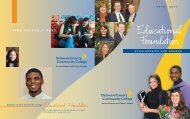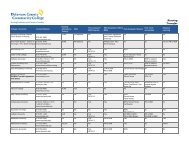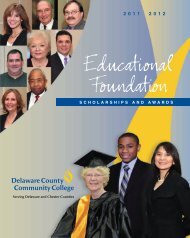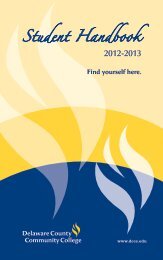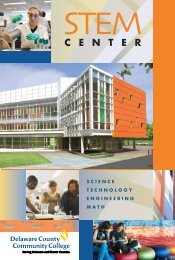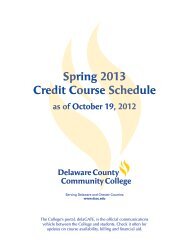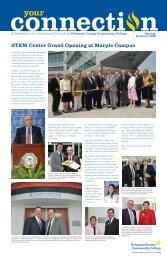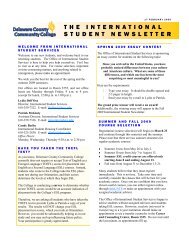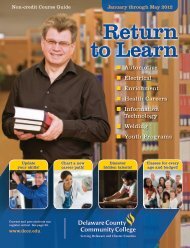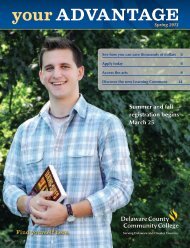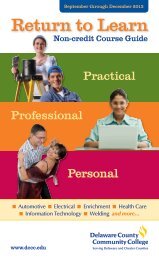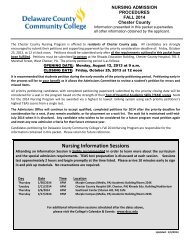2010 Catalog - Delaware County Community College
2010 Catalog - Delaware County Community College
2010 Catalog - Delaware County Community College
You also want an ePaper? Increase the reach of your titles
YUMPU automatically turns print PDFs into web optimized ePapers that Google loves.
114 COURSE DESCRIPTIONS<br />
• Identify dominant themes/concerns in the established<br />
and emerging literatures.<br />
• Recognize the identifying characteristics of the literature<br />
of each culture as well as the universals evident in<br />
all literatures.<br />
• Demonstrate an awareness of the struggle of writers of<br />
the emerging literatures to find a voice, an audience<br />
and a hearing.<br />
• Articulate their responses to the cultures and writers<br />
encountered in the form of analytical/argumentative,<br />
researched and documented essays.<br />
Prereq. ENG 112<br />
3 Credits 3 Weekly Lecture Hours<br />
ENG 242<br />
Bible As Literature<br />
To survey the development and content of the Bible,<br />
this course of study includes the historical context and<br />
literary style.<br />
Upon successful completion of this course, students<br />
should be able to:<br />
• Identify and describe the literary style of the Books of<br />
the Bible.<br />
• Distinguish the various themes in the Bible.<br />
• Describe the historical and social context of the material.<br />
• Describe the development of the canon.<br />
• Answer comprehensive questions on biblical context.<br />
• Write a paper using the historical critical method.<br />
Prereq. ENG 100<br />
3 Credits 3 Weekly Lecture Hours<br />
ENG 243<br />
Topics in Contemporary<br />
Literature<br />
Selected topics and themes from the literature of recent<br />
decades, including recent developments in the drama,<br />
current movements in modern poetry and the fiction<br />
of today.<br />
Upon successful completion of this course, students<br />
should be able to:<br />
• Identify various motifs found in modern literature such as<br />
wasteland image, fantasy, myth and alienation.<br />
• Discuss such concepts as existentialism, idealism and<br />
expressionism as found in modern literature.<br />
• Identify socio-economic and historical influences on<br />
the writers.<br />
• Interpret the works according to the writer's intellectual<br />
and emotional response to them.<br />
• Analyze literature in one or more critical research papers.<br />
Prereq. ENG 112<br />
3 Credits 3 Weekly Lecture Hours<br />
ENG 245<br />
Black American Literature<br />
This course is a comprehensive survey of the writings<br />
of African Americans beginning with the 18th century<br />
through the present. By way of reading, lecture and<br />
discussion, students analyze the various genres, topics,<br />
mores and traditions identified with African Americans,<br />
their historical and cultural significance.<br />
Upon successful completion of this course, students<br />
should be able to:<br />
• Discuss the roles of African Americans in the larger<br />
culture as reflected in selected literature.<br />
• Trace historical developments among Blacks in America<br />
from their African roots through slavery, the Civil War<br />
and the industrialized 20th century.<br />
• Analyze literary elements of the works studied.<br />
• Discuss the origins of racial stereotypes, discrimination<br />
and segregation as they appear in selected works.<br />
• Write an essay discussing the aforementioned topics.<br />
Prereq. ENG 100<br />
3 Credits 3 Weekly Lecture Hours<br />
ENG 250<br />
Children's Literature<br />
This course is a critical and analytical study of a variety<br />
of texts that represent the many genres of children's<br />
literature. It will emphasize how children are influenced by<br />
literature and how children's literature reflects the values of<br />
the particular culture that produces it. Upon successful<br />
completion of this course, students should be able to:<br />
• Recognize the characteristics of the different genres of<br />
children's literature.<br />
• Determine and apply criteria for what may be considered<br />
as quality children's literature.<br />
• Analyze literary elements such as theme, character,<br />
and setting.<br />
• Evaluate the contributions that illustrations can make<br />
to a text.<br />
• Identify literature as a product of a particular<br />
cultural climate.<br />
• Discuss critically issues of gender, ethnicity, culture,<br />
and the individual that are present in the texts.<br />
• Design and research a written project that relates to a<br />
student's particular interest in children's literature.<br />
Prereq. ENG 112<br />
3 Credits 3 Weekly Lecture Hours<br />
(ESL) Eng as a Second Language<br />
ESL 023<br />
Elementary Grammar<br />
This is a high beginning multi-skills course to practice<br />
and learn grammar in listening, speaking, reading and<br />
writing for everyday life and in college. Students must take<br />
this course with other ESL skills courses in writing (ESL<br />
024), reading (ESL 025) and listening/speaking (ESL 026).<br />
Upon successful completion of the course, students<br />
should be able to:<br />
• Use the simple present, past and future tenses of regular<br />
and irregular verbs.<br />
• Use with some accuracy the present and past continuous,<br />
and the present perfect tenses.<br />
• Understand and use yes/no and wh- questions.<br />
• Produce and use sentences with if, when, after, before,<br />
because and while with correct verb tenses.<br />
• Use models of ability, request and necessity.<br />
• Use with some accuracy prepositions of time, place,<br />
pronouns and count/non-count nouns.<br />
• Use with some accuracy comparisons and superlatives.<br />
• Learn and use language confidently and appropriately.<br />
Prereq. Placement Test<br />
3 Credits 3 Weekly Lecture Hours<br />
ESL 024<br />
Elementary Writing<br />
This course is for advanced beginners who can write<br />
basic sentences and have some knowledge of English<br />
sentence structure. The course covers basic grammatical<br />
structures and introduces students to simple paragraph<br />
writing as well as other types of writing needed in<br />
everyday life.<br />
Upon successful completion of the course, students<br />
should be able to:<br />
• Write simple, clear sentences with correct capitalization<br />
and punctuation.<br />
• Write simpler forms of compound and complex sentences<br />
with appropriate linking words.<br />
• Write unified paragraphs of 8 to 10 sentences about<br />
people, places and events.<br />
• Collect and organize information for use in sentence writing.<br />
• Recognize and identify the basic parts of speech in<br />
writing using the correct dictionary abbreviations.<br />
• Use the basic verb tenses to indicate present, past and<br />
future time.<br />
• Use the common models and prepositions of time and<br />
location correctly.<br />
• Develop some skill in recognizing and correcting<br />
common writing errors.<br />
• Show improved ability to use correct word endings<br />
and articles.<br />
Prereq. Placement Test<br />
4 Credits 3 Weekly Lecture Hours<br />
2 Weekly Laboratory Hours<br />
ESL 025<br />
Elementary Reading<br />
This advanced-beginner course is designed to develop<br />
students' ability to use reading strategies and to expand<br />
vocabulary in order to understand simplified texts.<br />
Students will normally take this course with Elementary<br />
Writing (ESL 024) and Elementary Speaking/Listening (ESL<br />
026). Two hours per week of tutoring are required. In the<br />
course, students should be able to:<br />
• Read text appropriate for this level.<br />
• Respond to questions and organize information from<br />
readings into simple outlines and grids.<br />
• Find main ideas, topic sentences and details.<br />
• Predict content by asking questions before reading.<br />
• Use strategies to infer the meaning of vocabulary,<br />
decode difficult sentences, and interpret punctuation<br />
and connectors.<br />
• Skim and scan for information.<br />
• Expand vocabulary.<br />
• Use an English-English dictionary for ESL learners<br />
Prereq. Placement Test<br />
4 Credits 3 Weekly Lecture Hours<br />
2 Weekly Laboratory Hours<br />
ESL 026<br />
Elementary Listening/Speaking<br />
This is a course for advanced beginners who have some<br />
basic knowledge of English and some functional communicative<br />
ability (e.g., simple questions and answers on topics<br />
of everyday interest). Class time is devoted to speaking for<br />
everyday needs, grammar practice, pronunciation, intensive<br />
listening to short, simplified narratives and listening for<br />
specific information in extended narratives and conversations.<br />
Students normally take this course along with Elementary<br />
Writing (ESL 024) and Elementary Reading (ESL 025). The<br />
course also has two hours of lab time, which will provide<br />
students with additional listening practice.<br />
Upon successful completion of the course, students<br />
should be able to:<br />
• Ask and answer questions about their own life situations.<br />
Use courtesy in various everyday situations.<br />
• Describe or narrate an event using two or more<br />
sentences.<br />
• Learn the sound system of English, and practice<br />
pronunciation and intonation.<br />
• Develop listening strategies to understand information<br />
necessary for everyday life (e.g., weather forecasts).<br />
• Understand simplified, extended narratives (e.g., lectures<br />
and dialogues).<br />
Prereq. Placement Test<br />
4 Credits 3 Weekly Lecture Hours<br />
2 Weekly Laboratory Hours<br />
ESL 033<br />
Intermediate Grammar I<br />
This course is a continuation of Elementary Grammar<br />
(ESL 023). Students practice grammatical structures through<br />
reading, writing, speaking and listening tasks in a classroom<br />
setting. This course is helpful for students who are fluent<br />
in English, but who need to develop the accuracy that is<br />
necessary for success in college. The course is also<br />
recommended for new international students who may<br />
have memorized grammar rules, but cannot apply them<br />
in conversational or academic situations.<br />
DELAWARE COUNTY COMMUNITY COLLEGE



